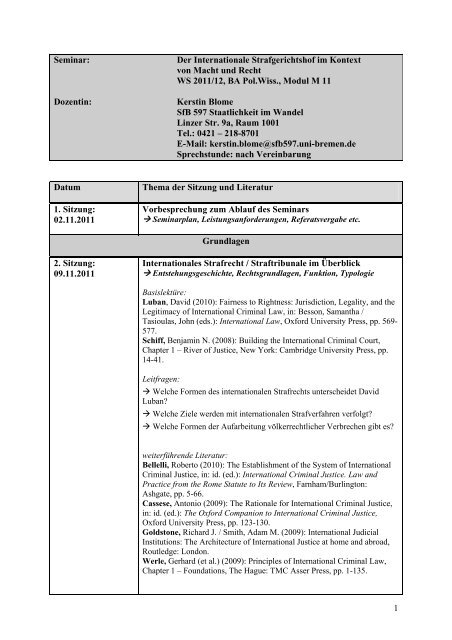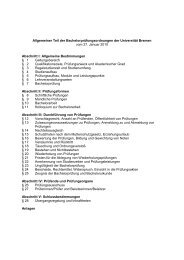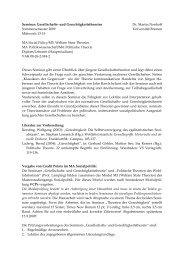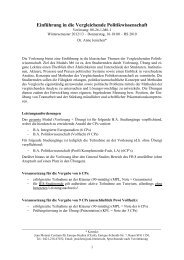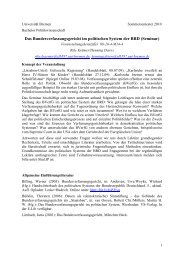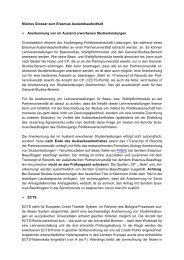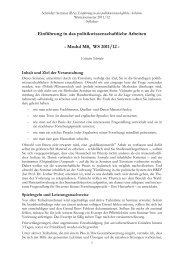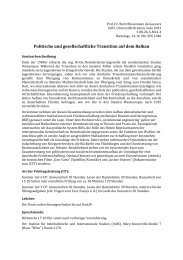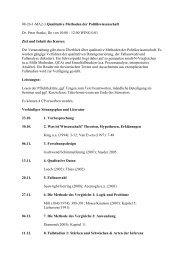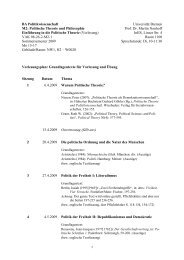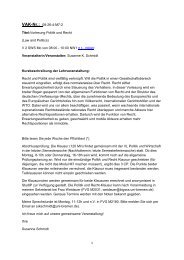Seminar: Der Internationale Strafgerichtshof im Kontext von Macht ...
Seminar: Der Internationale Strafgerichtshof im Kontext von Macht ...
Seminar: Der Internationale Strafgerichtshof im Kontext von Macht ...
Erfolgreiche ePaper selbst erstellen
Machen Sie aus Ihren PDF Publikationen ein blätterbares Flipbook mit unserer einzigartigen Google optimierten e-Paper Software.
<strong>Seminar</strong>:<br />
Dozentin:<br />
<strong>Der</strong> <strong>Internationale</strong> <strong>Strafgerichtshof</strong> <strong>im</strong> <strong>Kontext</strong><br />
<strong>von</strong> <strong>Macht</strong> und Recht<br />
WS 2011/12, BA Pol.Wiss., Modul M 11<br />
Kerstin Blome<br />
SfB 597 Staatlichkeit <strong>im</strong> Wandel<br />
Linzer Str. 9a, Raum 1001<br />
Tel.: 0421 – 218-8701<br />
E-Mail: kerstin.blome@sfb597.uni-bremen.de<br />
Sprechstunde: nach Vereinbarung<br />
Datum<br />
1. Sitzung:<br />
02.11.2011<br />
Thema der Sitzung und Literatur<br />
Vorbesprechung zum Ablauf des <strong>Seminar</strong>s<br />
<strong>Seminar</strong>plan, Leistungsanforderungen, Referatsvergabe etc.<br />
Grundlagen<br />
2. Sitzung:<br />
09.11.2011<br />
<strong>Internationale</strong>s Strafrecht / Straftribunale <strong>im</strong> Überblick<br />
Entstehungsgeschichte, Rechtsgrundlagen, Funktion, Typologie<br />
Basislektüre:<br />
Luban, David (2010): Fairness to Rightness: Jurisdiction, Legality, and the<br />
Legit<strong>im</strong>acy of International Cr<strong>im</strong>inal Law, in: Besson, Samantha /<br />
Tasioulas, John (eds.): International Law, Oxford University Press, pp. 569-<br />
577.<br />
Schiff, Benjamin N. (2008): Building the International Cr<strong>im</strong>inal Court,<br />
Chapter 1 – River of Justice, New York: Cambridge University Press, pp.<br />
14-41.<br />
Leitfragen:<br />
Welche Formen des internationalen Strafrechts unterscheidet David<br />
Luban?<br />
Welche Ziele werden mit internationalen Strafverfahren verfolgt?<br />
Welche Formen der Aufarbeitung völkerrechtlicher Verbrechen gibt es?<br />
weiterführende Literatur:<br />
Bellelli, Roberto (2010): The Establishment of the System of International<br />
Cr<strong>im</strong>inal Justice, in: id. (ed.): International Cr<strong>im</strong>inal Justice. Law and<br />
Practice from the Rome Statute to Its Review, Farnham/Burlington:<br />
Ashgate, pp. 5-66.<br />
Cassese, Antonio (2009): The Rationale for International Cr<strong>im</strong>inal Justice,<br />
in: id. (ed.): The Oxford Companion to International Cr<strong>im</strong>inal Justice,<br />
Oxford University Press, pp. 123-130.<br />
Goldstone, Richard J. / Smith, Adam M. (2009): International Judicial<br />
Institutions: The Architecture of International Justice at home and abroad,<br />
Routledge: London.<br />
Werle, Gerhard (et al.) (2009): Principles of International Cr<strong>im</strong>inal Law,<br />
Chapter 1 – Foundations, The Hague: TMC Asser Press, pp. 1-135.<br />
1
3. Sitzung:<br />
16.11.2011<br />
Warum und unter welchen Bedingungen errichten Staaten<br />
internationale Straftribunale? Erklärungsansätze<br />
unterschiedlicher Theorieschulen<br />
Basislektüre:<br />
Bassiouni, Cherif M. (2009): International Cr<strong>im</strong>inal Justice in Historical<br />
Perspective: The Tension between States’ Interests and the Pursuit of<br />
International Justice, in: Cassese, Antonio (ed.): The Oxford Companion to<br />
International Cr<strong>im</strong>inal Justice, Oxford University Press, pp. 131.142.<br />
Cassese, Antonio (2009): The Rationale for International Cr<strong>im</strong>inal Justice,<br />
in: id. (ed.): The Oxford Companion to International Cr<strong>im</strong>inal Justice,<br />
Oxford University Press, pp.123-130.<br />
Rudolph, Christopher (2001): Constructing an Atrocities Reg<strong>im</strong>e: The<br />
Politics of War Cr<strong>im</strong>es Tribunals, in: International Organization, vol. 55<br />
(3), pp. 655-691.<br />
Leitfragen:<br />
Welches sind die Grundannahmen der realistischen Schule, des<br />
Konstruktivismus sowie des liberalen Institutionalismus <strong>im</strong> Hinblick auf die<br />
Errichtung <strong>von</strong> Straftribunalen?<br />
Welche Faktoren sind nach Ansicht der Autoren maßgeblich für die<br />
Errichtung bzw. Nicht-Errichtung internationaler Tribunale?<br />
weiterführende Literatur:<br />
Helfer, Laurence R. / Slaughter, Anne-Marie (2005): Why States Create<br />
International Tribunals: A Response to Professors Posner and Yoo, in:<br />
California Law Review, vol. 93 (3), pp. 899-930.<br />
Krell, Gert (2004): Weltbilder und Weltordnung. Einführung in die Theorie<br />
der <strong>Internationale</strong>n Beziehungen, Kap. 6 (Realismus), Kap. 7<br />
(Liberalismus), Kap. 8 (Institutionalismus), Kap. 11 (Konstruktivismus),<br />
Baden-Baden: Nomos.<br />
4. Sitzung:<br />
23.11.2011<br />
<strong>Der</strong> <strong>Internationale</strong> <strong>Strafgerichtshof</strong> (IStGH) <strong>im</strong> Überblick:<br />
Entstehungsgeschichte, institutionelles Design/Organe, Spezifika des<br />
Statuts, Funktion, Praxis<br />
Basislektüre:<br />
Scheffer, David (2011): The International Cr<strong>im</strong>inal Court, in: Schabas,<br />
William A. / Bernaz, Nadia (eds.): Routledge Handbook of International<br />
Cr<strong>im</strong>inal Law, Routledge: Oxon/New York, pp. 67-83<br />
Schiff, Benjamin N. (2008): Building the International Cr<strong>im</strong>inal Court,<br />
Chapter 3 – The Statute – Justice versus Sovereignty, New York:<br />
Cambridge University Press, pp. 68-92.<br />
Leitfragen:<br />
Was unterscheidet den IStGH vom ICTY und dem ICTR?<br />
Was versteht man in Bezug auf das Römische Statut unter<br />
Komplementarität?<br />
Unter welchen Bedingungen kann der IStGH seine Gerichtsbarkeit<br />
ausüben?<br />
Inwiefern wird die Arbeit des IStGH vom Prinzip staatlicher<br />
Souveränität beschränkt und umgekehrt?<br />
2
weiterführende Literatur:<br />
Fassbender, Bardo (2002): <strong>Der</strong> <strong>Internationale</strong> <strong>Strafgerichtshof</strong>: auf dem<br />
Weg zu einem „Weltinnenrecht“? In: Aus Politik und Zeitgeschichte, B 27-<br />
28, S. 32-38.<br />
Kaul, Hans-Peter (2003): <strong>Der</strong> <strong>Internationale</strong> <strong>Strafgerichtshof</strong>: Eine<br />
Bestandsaufnahme <strong>im</strong> Frühjahr 2003, in: Die Friedens-Warte, Jg. 78 (1), S.<br />
11-27.<br />
Kreß, Claus (2009): The International Cr<strong>im</strong>inal Court as a Turning Point in<br />
the History of International Cr<strong>im</strong>inal Justice, in: Cassese, Antonio (ed.): The<br />
Oxford Companion to International Cr<strong>im</strong>inal Justice, Oxford University<br />
Press, pp. 143-159.<br />
Römisches Statut (http://beck-online.beck.de/default.aspx?bcid=Y-100-G-<br />
IStGHSt).<br />
Schabas, William A. (2007): An Introduction to the International Cr<strong>im</strong>inal<br />
Court, Cambridge University Press, 3. ed.<br />
5. Sitzung:<br />
30.11.2011<br />
Jenseits <strong>von</strong> <strong>Macht</strong>politik und Kosten-Nutzen-Kalkül:<br />
Erklärungsversuche der Spezifika des Römischen Statuts<br />
Basislektüre:<br />
Fehl, Caroline (2004): Explaining the International Cr<strong>im</strong>inal Court: A<br />
‘Practice Test’ for Rationalist and Constructivist Approaches, in: European<br />
Journal of International Relations, vol. 10 (3), pp. 357-394.<br />
Leonard, Eric K. (2005): The Onset of Global Governance. International<br />
Relations Theory and the International Cr<strong>im</strong>inal Court, Chapter 5 – The<br />
Pr<strong>im</strong>acy of the State, pp. 85-105.<br />
Leitfragen:<br />
Inwieweit unterscheiden sich rationalistische und konstruktivistische<br />
Erklärungsansätze in Bezug auf die Errichtung des IStGH?<br />
Welches sind die Grundannahmen der realistischen Schule, des<br />
Institutionalismus sowie des Konstruktivismus <strong>im</strong> Hinblick auf die<br />
Errichtung <strong>von</strong> internationalen Institutionen?<br />
Welche Faktoren waren nach Ansicht der Autoren jeweils maßgeblich<br />
für die Errichtung des IStGH?<br />
Welcher der Theorieansätze erklärt Ihrer Ansicht nach die Errichtung des<br />
IStGH am besten?<br />
weiterführende Literatur:<br />
Deitelhoff, Nicole (2009): The Discursive Power of Legalization: Charting<br />
Islands of Persuasion in the ICC Case, in: International Organization, vol.<br />
63 (1), pp. 33-65.<br />
Leonard, Eric K. (2005): The Onset of Global Governance. International<br />
Relations Theory and the International Cr<strong>im</strong>inal Court, Chapter 4 –<br />
Mainstream Cooperation Theory, pp. 65-84.<br />
S<strong>im</strong>mons, Beth / Danner, Allison (2009): The International Cr<strong>im</strong>inal Court,<br />
in: Armstrong, David (ed.): Routledge Handbook of International Law,<br />
Routledge: London/New York, pp. 239-245.<br />
3
Kernaspekte der Arbeit des IStGH:<br />
Legit<strong>im</strong>ität, Effektivität, Unabhängigkeit, Verantwortlichkeit<br />
6. Sitzung:<br />
07.12.2011<br />
Leidet der IStGH unter einem Demokratiedefizit?<br />
Basislektüre:<br />
Fichtelberg, Aaron (2006): Democratic Legit<strong>im</strong>acy and the International<br />
Cr<strong>im</strong>inal Court. A Liberal Defense, in: Journal of International Cr<strong>im</strong>inal<br />
Justice, vol. 4, pp. 765-785.<br />
Morris, Madeline (2002): The Democratic Dilemma of the International<br />
Cr<strong>im</strong>inal Court, in: Buffalo Cr<strong>im</strong>inal Law Review, vol. 5, pp. 591-600<br />
Leitfragen:<br />
Warum leidet der IStGH nach Ansicht <strong>von</strong> Madeline Morris unter einem<br />
demokratischen Dilemma?<br />
Was macht den IStGH zu einem „echten“ supranationalen Organ?<br />
Welche Demokratiemodelle stellt Aaron Fichtelberg gegenüber?<br />
Welche Prinzipien garantieren aus Fichtelbergs Sicht die Legit<strong>im</strong>ität<br />
internationaler Strafverfahren?<br />
weiterführende Literatur:<br />
<strong>von</strong> Bogdandy, Armin / Venzke, Ingo (2011): Beyond Dispute:<br />
International Judicial Institutions as Lawmakers, in: German Law Journal,<br />
vol 12 (5), pp. 979-1004.<br />
<strong>von</strong> Bogdandy, Armin / Venzke, Ingo (2010): Zur Herrschaft<br />
internationaler Gerichte: Eine Untersuchung öffentlicher Gewalt und ihrer<br />
demokratischen Rechtfertigung, in: ZaöRV, Jg. 70, S. 1-49.<br />
7. Sitzung:<br />
14.12.2011<br />
Inwiefern kann der IStGH seine Legit<strong>im</strong>ität selbst beeinflussen?<br />
Diskursive Legit<strong>im</strong>ität und das Verhältnis des Gerichtshofs zur<br />
Zivilgesellschaft<br />
Basislektüre:<br />
Glasius, Marlies (2009): What is Global Justice and Who Decides? Civil<br />
Society and Vict<strong>im</strong> Responses to the International Cr<strong>im</strong>inal Court’s First<br />
Investigations, in: Human Rights Quarterly, vol. 31 (2), pp. 498-520.<br />
Struett, Michael J. (2009): The Politics of Discursive Legit<strong>im</strong>acy:<br />
Understanding the Dynamics and Implications of Prosecutorial Discretion at<br />
the International Cr<strong>im</strong>inal Court, in: Roach, Steven C. (ed.): Governance,<br />
Order, and the International Cr<strong>im</strong>inal Court, Oxford University Press, pp.<br />
107-132.<br />
Leitfragen:<br />
Welche Aspekte der bisherigen Arbeit des IStGH sind nach Ansicht <strong>von</strong><br />
Marlies Glasius problematisch <strong>im</strong> Hinblick auf die Legit<strong>im</strong>ität des IStGH?<br />
Wie beurteilen Sie Glasius These, dass der IStGH als „creation of global<br />
civil society“ insbesondere darauf achten muss, <strong>von</strong> dieser als legit<strong>im</strong><br />
erachtet zu werden?<br />
Was versteht Michael Struett unter der „logic of argumentation“ und<br />
inwiefern trägt sie seiner Meinung nach zur Legit<strong>im</strong>ation des IStGH bei?<br />
4
weiterführende Literatur:<br />
Akhavan, Payam (2001): Beyond Impunity: Can International Cr<strong>im</strong>inal<br />
Justice Prevent Future Atrocities? In: American Journal of International<br />
Law, vol, 95 (7), pp. 7-31.<br />
Grossman, Nienke (2009): Legit<strong>im</strong>acy and International Adjudicative<br />
Bodies, in: George Washington International Law Review, vol. 107, pp.<br />
107-161.<br />
Schiff, Benjamin N. (2008): Building the International Cr<strong>im</strong>inal Court,<br />
Chapter 5 – NGOs – Advocates, Assets, Critics, and Goads, New York:<br />
Cambridge University Press, pp. 144-164.<br />
8. Sitzung:<br />
21.12.2011<br />
– ZWISCHENEVALUATION –<br />
Ist der IStGH eine effektive internationale Organisation?<br />
Basislektüre:<br />
Leonard, Eric K. / Roach, Steven C. (2009): From Realism to Legalization:<br />
A Rationalist Assessment of the International Cr<strong>im</strong>inal Court in the<br />
Democratic Republic of Congo, in: Roach, Steven C. (ed.): Governance,<br />
Order, and the International Cr<strong>im</strong>inal Court, Oxford University Press, pp.<br />
55-72.<br />
Shany, Juval (2010): Assessing the Effectiveness of International Courts:<br />
Can the Unquantifiable be Quantified? In: International Law Forum of the<br />
Hebrew University of Jerusalem Law Faculty, Research Paper No. 03-10.<br />
Leitfragen:<br />
Was versteht man unter „Effektivität“ <strong>im</strong> Hinblick auf internationale<br />
Gerichte <strong>im</strong> Allgemeinen und den IStGH <strong>im</strong> Besonderen?<br />
Welches sind die Grundannahmen des sog. „Legalization“-Ansatzes?<br />
Welche Faktoren sind relevant <strong>im</strong> Hinblick auf die Effektivität bzw.<br />
Ineffektivität des IStGH?<br />
weiterführende Literatur:<br />
Helfer, Laurence R. / Slaughter, Anne-Marie (1997): Toward a Theory of<br />
Effective International Adjudication, in: The Yale Law Journal, vol. 107 (2),<br />
pp. 273-391.<br />
Keohane, Robert O. / Moravcsik, Andrew / Slaughter, Anne-Marie (2000):<br />
Legalized Dispute Resolution: Interstate and Transnational, in:<br />
International Organization, vol. 54 (3), pp. 457-488.<br />
Watts, Arthur (2001): Enhancing the Effectiveness of Procedures of<br />
International Dispute Settlement, in: Max Planck Yearbook of United<br />
Nations Law, vol. 5, pp. 21-39.<br />
Veranstaltungsfreie Zeit: 24.12.2011 – 07.01.2012<br />
9. Sitzung:<br />
11.01.2012<br />
Zum Verhältnis <strong>von</strong> <strong>Strafgerichtshof</strong> und Staatenwelt: Wie (un-)<br />
abhängig ist der IStGH <strong>von</strong> den Staaten? Und welche Rolle spielt<br />
die USA?<br />
Basislektüre:<br />
Roper, Steven D. / Barria, Lilian A. (2008): State Co-operation and<br />
International Cr<strong>im</strong>inal Court Bargaining Influence in the Arrest and the<br />
Surrender of Suspects, in: Leiden Journal of International Law, vol. 21, pp.<br />
457-476.<br />
5
Schiff, Benjamin N. (2008): Building the International Cr<strong>im</strong>inal Court,<br />
Chapter 6 – ICC – State Relations, New York: Cambridge University Press,<br />
pp. 165-193.<br />
Leitfragen:<br />
Welche Faktoren best<strong>im</strong>men den Grad der (Un-)Abhängigkeit<br />
internationaler Gerichte <strong>von</strong> Staaten?<br />
Aus welchen Gründen lehnt die USA den IStGH so rigoros ab und wie<br />
wirkt sich die ablehnende Haltung der USA auf den Gerichtshof aus?<br />
Welche Variablen sind nach Ansicht <strong>von</strong> Roper/Barria relevant für die<br />
Verhandlungsmacht des IStGH?<br />
Was unterscheidet den Fall DRC <strong>von</strong> der Situation <strong>im</strong> Sudan (<strong>im</strong><br />
Hinblick auf die Verhandlungsmacht des IStGH)?<br />
weiterführende Literatur:<br />
Alter, Karen J. (2008): Agents or Trustees? International Courts in their<br />
Political Context, in: European Journal of International Relations, vol. 14<br />
(1), pp. 33-63.<br />
de Bertodano, Sylvia (2002): Judicial Independence in the International<br />
Cr<strong>im</strong>inal Court, in: Leiden Journal of International Law, vol. 15, pp. 409-<br />
430.<br />
Posner, Eric A. / Yoo, John C. (2005): Judicial Independence in<br />
International Tribunals, in: California Law Review, vol. 93 (1), pp. 1-29;<br />
66-74.<br />
Smith, Charles A. / Smith, Heather M. (2009): Embedded Realpolitik?<br />
Reevaluating United States’ Opposition to the International Cr<strong>im</strong>inal Court,<br />
in: Roach, Steven C. (ed.): Governance, Order, and the International<br />
Cr<strong>im</strong>inal Court, Oxford University Press, pp. 29-53.<br />
10. Sitzung:<br />
18.01.2012<br />
Partner oder Konkurrenten? Das schwierige Verhältnis <strong>von</strong><br />
IStGH und UN-Sicherheitsrat<br />
Basislektüre:<br />
Sarooshi, D. (2001): Aspects of the Relationship between the International<br />
Cr<strong>im</strong>inal Court and the United Nations, in: Netherlands Yearbook of<br />
International Law, vol. 32, pp. 27-53.<br />
Jain, Neha (2005): A Separate Law for Peacekeepers: The Clash between<br />
the Security Council and the International Cr<strong>im</strong>inal Court, in: European<br />
Journal of International Law, vol. 16 (2), pp. 239-254.<br />
Ciampi, Annalisa (2008): The Proceedings against President Al Bashir and<br />
the Prospects of their Suspension under Article 16 ICC Statute, in: Journal<br />
of International Cr<strong>im</strong>inal Justice, vol. 6, pp. 885-897.<br />
Leitfragen:<br />
In welchem (rechtlichen) Verhältnis stehen der UN-Sicherheitsrat und<br />
der <strong>Strafgerichtshof</strong> zueinander?<br />
Inwiefern sind die vorhandenen Regeln in Bezug auf das Verhältnis <strong>von</strong><br />
UN-Sicherheitsrat und IStGH problematisch?<br />
Sollte ein politisches Organ wie der UN-Sicherheitsrat überhaupt<br />
Einfluss auf ein juristisches Organ wie den IStGH nehmen können? (Pro u.<br />
Contra)<br />
6
weiterführende Literatur:<br />
Bergsmo, Morten / Pejić, Jelena (2008): Artikel 16. Deferral of<br />
investigation or prosecution, in: Triffterer, Otto (ed.): Commentary on the<br />
Rome Statute of the International Cr<strong>im</strong>inal Court. Observers’ Notes, Article<br />
by Article, München: Beck, S. 595-604.<br />
Schabas, William A. (2010): The International Cr<strong>im</strong>inal Court: A<br />
Commentary on the Rome Statute, Art. 16. Deferral of investigation and<br />
prosecution, Oxford University Press, pp. 325-334.<br />
Shraga, D. (2009): Politics and Justice: The Role of the Security Council,<br />
in: Cassese, Antonio (ed.): The Oxford Companion to International<br />
Cr<strong>im</strong>inal Justice, Oxford University Press, pp.168-174.<br />
Stahn, Carsten (2003): The Ambiguities of Security Council Resolution<br />
1422 (2002), in: European Journal of International Law, vol. 44 (1), pp. 84-<br />
104.<br />
Weller, Marc (2002): Undoing the Global Constitution: UN Security<br />
Council Action on the International Cr<strong>im</strong>inal Court, in: International<br />
Affairs, vol. 78 (4), pp. 693-712.<br />
11. Sitzung:<br />
25.01.2012<br />
Apolitisches, juristisches Organ oder politisch-strategischer<br />
Akteur? Zur Rolle des Anklägers<br />
Basislektüre:<br />
Greenawalt, Alexander K.A. (2007): Justice without Politics? Prosecutorial<br />
Discretion and the International Cr<strong>im</strong>inal Court, in: International Law and<br />
Politics, vol. 39, pp. 583-590 (Introduction); 590-650 (Chap. II, II, IV);<br />
650-673 (Chap. V, VI, VII).<br />
Leitfragen:<br />
Welche Dilemmata ergeben sich nach Ansicht des Autors durch die<br />
Ermessensfreiheit des Anklägers?<br />
Welche Vorschläge unterbreitet der Autor zur Verringerung des<br />
Legit<strong>im</strong>ationsdefizits bzw. zur Stärkung des Verantwortlichkeit des<br />
Anklägers?<br />
Was versteht der Autor unter dem „political deference model“ und wie<br />
überzeugend ist es zur Lösung der Problematik?<br />
weiterführende Literatur:<br />
deGuzman, Margaret (2011): Choosing to Prosecute: Expressive Selection<br />
at the International Cr<strong>im</strong>inal Court, Temple University, Legal Studies<br />
Research Paper Series, Research Paper No. 2011-16.<br />
Marston Danner, Allison (2003): Enhancing the Legit<strong>im</strong>acy and<br />
Accountability of Prosecutorial Discretion at the International Cr<strong>im</strong>inal<br />
Court, in: American Journal of International Law, vol. 97 (3’), pp. 510-552.<br />
Schabas, William A. (2008): ‘O Brave New World’: The Role of the<br />
Prosecutor of the International Cr<strong>im</strong>inal Court, in: Die Friedens-Warte, Jg.<br />
83 (4), S. 11-31.<br />
Stahn, Carsten / Sluiter, Göran (eds.) (2009): The Emerging Practice of The<br />
International Cr<strong>im</strong>inal Court, Part III – Prosecutorial Policy and Practice,<br />
Leiden/Bosten: Martinus Nijhoff Publishers, pp.185 et seqq.<br />
7
Peace versus Justice: Strafverfolgung ja oder nein, wann, wo und wie?<br />
12. Sitzung:<br />
01.02.2012<br />
Immunität <strong>von</strong> Staatsoberhäuptern: <strong>Der</strong> Haftbefehl gegen den<br />
Sudanesischen Präsidenten al-Bashir<br />
Basislektüre:<br />
Williams, Sahra / Sherif, Lena (2009): The Arrest Warrant for President al-<br />
Bashir: Immunities of Incumbent Heads of States and the International<br />
Cr<strong>im</strong>inal Court, in: Journal of Conflict & Security Law, vol. 14 (1), pp. 71-<br />
92.<br />
Stoett, Peter (2011): Justice, Peace, and Windmills: An Analysis of “Live<br />
Indictments” by the International Cr<strong>im</strong>inal Court, Paper Presented at the<br />
Annual Convention of the International Studies Association, Montréal,<br />
March 16-19, 2011.<br />
Leitfragen:<br />
War der IStGH berechtigt einen Haftbefehl gegen den amtierenden<br />
Präsidenten des Sudan auszustellen? (Pro und Contra Argumente)<br />
Welche Aspekte sollten lt. Peter Stoett <strong>im</strong> Hinblick auf internationale<br />
Haftbefehle für amtierende Amtsträger eine Rolle spielen?<br />
Wie überzeugend sind Stoetts Kritikpunkte an der Praxis des IStGH<br />
Haftbefehle gegen amtierende Funktionsträger auszustellen?<br />
weiterführende Literatur:<br />
Bianchi, Andrea (2009): State Responsibility and Cr<strong>im</strong>inal Liability of<br />
Individuals, in: Cassese, Antonio (ed.): The Oxford Companion to<br />
International Cr<strong>im</strong>inal Justice, Oxford University Press, pp. 16-24.<br />
Gosnell, Christopher (2008): The Request for an Arrest Warrant in Al<br />
Bashir. Idealistic Posturing or Calculated Plan? In: Journal of International<br />
Cr<strong>im</strong>inal Justice, vol. 6, pp. 841-851.<br />
ICJ: Case Concerning the Arrest Warrant of 11 April 2000 (Dem. Rep.<br />
Congo v Belgium) (2002), 41 ILM 536.<br />
Sikkink, Kathryn (2008): From State Responsibility to Individual Cr<strong>im</strong>inal<br />
Accountability: A New Regulatory Model for Core Human Rights<br />
Violations, Paper presented at the Annual Meeting of the American Political<br />
Science Association, Boston, August 28-31, 2008.<br />
Ssenyonjo, Manisuli (2009): The International Cr<strong>im</strong>inal Court and the<br />
Warrant of Arrest for Sudan’s President Al-Bashir: A Crucial Step Towards<br />
Challenging Impunity or a Political Decision? In: Nordic Journal of<br />
International Law, vol. 78, pp. 397-431.<br />
13. Sitzung:<br />
08.02.2012<br />
Defizite und Grenzen strafrechtlicher Aufarbeitung<br />
völkerrechtlicher Verbrechen und mögliche Alternativen<br />
Basislektüre:<br />
Keller, Linda M. (2007): Achieving Peace with Justice: The International<br />
Cr<strong>im</strong>inal Court and Ugandan Alternative Justice Mechanisms, in:<br />
Connecticut Journal of International Law, vol. 23, pp. 209-279.<br />
Leitfragen:<br />
Welche alternativen Formen der Aufarbeitung völkerrechtlicher<br />
Verbrechen werden <strong>im</strong> Text vorgestellt?<br />
Pro und Contra dieser Aufarbeitungsformen<br />
8
Welche Möglichkeiten bietet das Statut des IStGH zur Anwendung<br />
alternativer Aufarbeitungsmethoden<br />
Welche Aspekte sollte der IStGH berücksichtigen bevor er<br />
Strafverfahren zugunsten alternativer Methoden aussetzt?<br />
weiterführende Literatur:<br />
Alvarez, José E. (2009): Alternatives to International Cr<strong>im</strong>inal Justice, in:<br />
Cassese, Antonio (ed.): The Oxford Companion to International Cr<strong>im</strong>inal<br />
Justice, Oxford University Press, pp. 25-38.<br />
Majinge, Charles (2009): The International Cr<strong>im</strong>inal Court and the<br />
Question of Alternative Justice System in Africa: A Case of be Careful of<br />
What You Wish for? In: Verfassung und Recht in Übersee, Bd. 42, S. 151-<br />
172.<br />
Robinson, Darryl (2003): Serving the Interests of Justice: Amnesties, Truth<br />
Commissions and the International Cr<strong>im</strong>inal Court, in: European Journal of<br />
International Law, vol. 14 (3), pp. 481-505.<br />
Sarkin, Jeremy (2001): The Tension between Justice and Reconciliation in<br />
Rwanda: Politics, Human Rights, Due Process and t he Role of the Gacaca<br />
Courts in Dealing with the Genocide, in: Journal of African Law, vol. 45<br />
(2), pp. 143-172.<br />
Stahn, Carsten (2005): Complementarity, Amnesties and Alternative Forms<br />
of Justice: Some Interpretative Guidelines for the International Cr<strong>im</strong>inal<br />
Court, in: Journal of International Cr<strong>im</strong>inal Justice, vol. 3 (3), pp. 695-720.<br />
14. Sitzung:<br />
15.02.2012<br />
ABSCHLUSSDISKUSSION: Spielball mächtiger Staaten oder<br />
einflussreicher strategischer Akteur? Facetten der Rolle und<br />
Funktion des IStGH in den internationalen Beziehungen<br />
9


